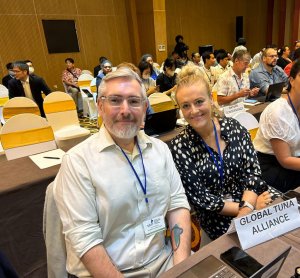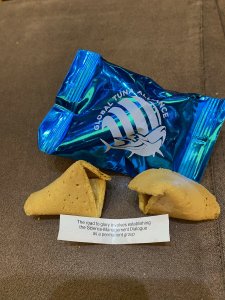
In what is a clear sign of the increasing attention paid by the global seafood sector tothe negotiations of tuna Regional Fisheries Management Organisations (tRFMOs), the Global Tuna Alliance (GTA) were accompanied as in-person observers by a representative from major seafood supplier New England Seafood International Ltd. (NESI) to the 19th Session of theWestern and Central Pacific Fisheries Commission (WCPFC). Despite being under the keen observation of a key market player and there being a number of commitments made to progress management procedures further down the line, the GTA find the lack of urgency in reaching binding agreements troubling.
The GTA, a pre-competitive, independent collaboration of some of the world’s biggest seafood supply chain companies and retailers, ran a campaign in the lead up to the meeting under the tagline “keep tuna stocks ‘in the green,’” a reference to the unique position that the WCPFC occupies as the only RFMO with healthy statuses across all of its major stocks of tuna. However, the GTA warned that without significant progress on harvest strategies, stocks may become overfished and it could lead to the suspension of the Marine Stewardship Council (MSC) certification held by many Western-Central Pacific tuna fisheries. Both outcomes would result in a sizeable loss of confidence in the region among the growing number of environmentally conscious tuna purchasers.

At the end of the week-long meeting between 27th November and 3rd December, the WCPFC agreed on management procedures for North Pacific albacore and skipjack, though the latter was non-binding. Meanwhile, no agreement was found for a revised workplan for setting target reference points for bigeye and yellowfin in 2023 or a revised workplan for agreeing a management procedure for South Pacific albacore in 2023; instead the timeline was extended to 25/26. There was also no agreement on establishing the science-manager dialogue, pivotal to the development of harvest strategies, as a permanent working group.
Reacting to the outcome of the meeting, Ruth Hoban said:
“NESI wanted to be at the meeting in-person to demonstrate how important it is to us and our customers that the tuna we source continues to be sustainable. The adoption of the skipjack and North Pacific albacore management procedures means that the WCPFC has its first harvest strategies in place. NESI wants to congratulate delegates on this great achievement.
“However, we are concerned that the lack of binding agreements on harvest strategies could jeopardise the future health of the stocks. We encourage WCPFC to continue to show leadership by progressing management plans for other stocks to ensure their long-term sustainability. This will give us the confidence to continue to supply our UK and European customers with tuna sourced from the Western-Central Pacific.”
Dr. Tom Pickerell, the Executive Director of the GTA added:
“The GTA are pleased to see the progress made on adopting management measures.
“Adopting science-based approaches to managing tuna stocks is a necessary requirement for many of our Partners who factor sustainability through accreditation in schemes like the MSC when deciding where to source their tuna from. The blue label is becoming an increasingly valued asset.
“Whether the steps taken at WCPFC will be enough to keep stocks ‘in the green’ and maintain the MSC certification held by several tuna fisheries in the region has yet to be seen.”
Once finalised and published, the agreements from WCPFC will be reviewed in detail by the independent conformity assessment bodies (CABs) – responsible for assessing the fisheries to the MSC Standard – to determine how they impact the ongoing MSC certification of tuna fisheries. Tuna fisheries which continue to meet the minimum requirements of MSC certification will have the opportunity for early application of the new MSC Fisheries Standard (version 3.0). This gives them an additional five years to meet the new requirements for more comprehensive harvest strategies.